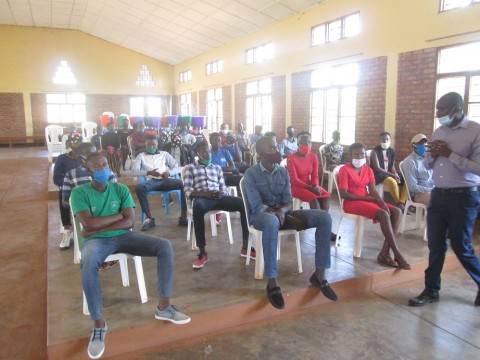Peace Building and Genocide Prevention Training Introduction
Without any phycological resilience which peacebuilding provides, the risks of increased hatred, extremism, conflict, and mass atrocities are far higher in youth when they are not equipped with peace education. Storytelling and testimonies from elder genocide survivors foster trust and facilitate an escalation of healing trauma, and building a peaceful community. Peace Education Initiative Rwanda provided “Peace Building and Genocide Prevention” Training to youth in Kayinza District, Rukara Sector on 11th July 2020. Attendees of the training were 50 youth, boys and girls. These youth are members of youth clubs affiliated to the Peace Education Initiative Rwanda; we train them to become exemplary and act as change-makers in other youth and their communities as well. Through the training, youth were equipped with knowledge about genocide studies and prevention. They developed critical thinking hence standing firm to proclaim for peace and humanity as a vital role in building sustainable peace in Rwanda. They were also urged to be peacemakers and agents of change in their communities. Again, the training was the best platform for young people to engage and acquire knowledge and skills for genocide prevention and other crimes against humanity as well as getting enlightened with human rights education.
Objectives
Objectives for the “Peace Building and Genocide Prevention” Youth training are as follows:
- Develop critical thinking towards peacebuilding and restoration of social cohesion in the country.
- Foster peaceful coexistence among young people
- Connect post-genocide young generation with the past and engage them to build a better future
Activity
On Saturday, 11th July 2020, Peace Education Initiative Rwanda held Peace Building and Genecode prevention training to Youth from youth clubs affiliated to PeacEdu in Kayonza District, Rukara Sector. PeacEdu used storytelling, testimonials, and experienced people to talk about the truth of genocide and show youth what it takes to build a tolerant society that is free of hatred.
Albert Rutikanga, the Executive Director of Peace Education Initiative Rwanda trained the youth whereby he insisted on the youths’ part in building peace and being human right defenders. Albert Rutikanga explained genocide as violent crimes committed against a group with the intent to destroy the existence of the group. It is prepared by the government targeting a specific group of people. This marks its difference from mass atrocities where a group of people may be killed by another group of people.
Eight stages are as follows:
- Classification: This is characterized by the division of the natural and social world into categories by distinguishing people into categories “us” and “them,” between members of our group and others. Then, those groups of people are treated differently.
- Symbolization: Then symbols are used to signify our classifications. For Genocide
Against Tutsi people were named Hutu other Tutsi and it was written in their national ID. - Dehumanization: This is denying that others are human beings as a step that permits killing with impunity.
- Organization: On this stage genocide is organized mostly by states but also militias and
hate groups. - Polarization: This is symbolized by killings with systematic elimination of moderates
who would slow the cycle? - Preparation: In these steps, there is identifying people who are to be killed. Making a list of victims, marking houses, making maps that will be used. The individuals are required to carry their ID cards which will identify their group.
- Extermination: This is called Extermination rather than murder because the victims are not considered human. Then, the targeted members of the group are killed, they kill men,
women, and children. - Denial: In this last step, the mass graves are dug up and hidden. Historical records are burned, or closed to historians. Then, people who participated in genocide start to call it mass killing or war. Conclusion
Through peacebuilding and genocide prevention training, youth are equipped with critical thinking skills that enable them to build a tolerant society. Again, youth gain a deep understanding of the history of Rwanda, especially about the 1994 Genocide against Tutsi. Hence, they decide to join their efforts in preventing genocide and to be champion of humanity.


